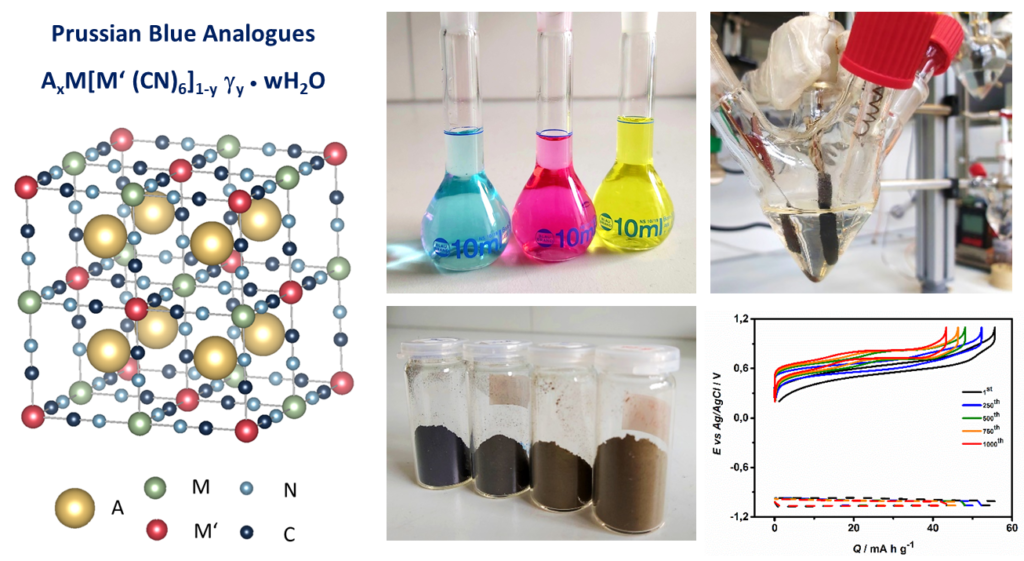Electrochemical energy storage systems are currently relative expensive, and in many cases are characterized by low safety and high toxicity, in terms of high risk of flammability, organic electrolyte leakage, and presence of toxic elements such as cobalt. However, energy storage systems are essential for an optimized use of the energy harvested from renewable sources, and for the necessary adjustments that a fluctuating electricity supply needs before being connected to an electric power grid. At present, established technologies such as lead/gel, NiCd, NiMH and, Li-Ion/LFP are considered the benchmark. With regard to critical elements such as lead, Cd and lithium, favorable alternative technologies offering a higher level of environmental safety are of principal interest.
In this respect, the aqueous zinc-based storage technology appears to be a very attractive economic alternative strategy. In addition, zinc is easier to recycle than lithium.
Due to the problem of the formation of zinc dendrites, which remains unsolved, earlier zinc-based cell concepts (such as the NiOOH/Zn cell) have not yet been able to penetrate in the market. Furthermore, in the case of the alkaline zinc/air cell, the low energy yield (~50%) and carbonate formation are two major disadvantages. This consortium will develop an almost pH-neutral zinc-ion cell, which will have a higher or comparably high energy density than NiMH or Li-Ion/LFP. Such aqueous Zn-ion battery (ZIB) will be constituted of a metallic Zn anode, and a cathode based either on manganese oxide or on Prussian blue analogues (PBAs).
Within the scope of the consortium, the transfer of the developed Zn-ion technology from the laboratory scale to an industrial battery level will be pursued. Moreover, it is further planned to develop an aqueous ZIB as a demonstrator with a typical working voltage of 12/24/48 V

Publications
- M. Tribbia, J. Glenneberg, F. La Mantia, G. Zampardi “Effect of the Current Density on the Electrodeposition Efficiency of Zinc in Aqueous Zinc-Ion Batteries“
ChemElectroChem 11 (2023). - M. Baghodrat, G. Zampardi, J. Glenneberg, F. La Mantia, “Influence of the Thermal Treatment on the Structure and Cycle Life of Copper Hexacyanoferrate for Aqueous Zinc-Ion Batteries“
Batteries 9 (2023). (Invited) - M. Tribbia, G. Zampardi, F. La Mantia, “Towards the commercialization of rechargeable aqueous zinc ion batteries: The challenge of the zinc electrodeposition at the anode“
Current Opinion in Electrochemistry 38 (2023). (Invited) - G. Zampardi, F. La Mantia, “Open challenges and good experimental practices in the research field of aqueous Zn-ion batteries“,
Nature Communications. 13, (2022). (Invited) - M. Tribbia, J. Glenneberg, G. Zampardi, F. La Mantia, “Highly Efficient, Dendrite-Free Zinc Electrodeposition in Mild Aqueous Zinc-Ion Batteries through Indium-based Substrates“,
Batteries & Supercaps, e202100381 (2022). (Invited) - G. Zampardi, M. Warnecke, J. Glenneberg, M. Tribbia, F. La Mantia, “Effect of the Reactants Concentration on the Synthesis of Copper Hexacyanoferrate for Aqueous Zinc-Ion Batteries“,
Electrochem. Commun. 126, 107030 (2021). (Invited) - G. Kasiri, J. Glenneberg, R. Kun, G. Zampardi , F. La Mantia, “Microstructural Changes of Prussian Blue Derivatives during Cycling in Zinc Containing Electrolytes“,
ChemElectroChem 7 3301-3310 (2020). - G. Zampardi, F. La Mantia, “Prussian Blue analogues as aqueous Zn-ion batteries electrodes: Current challenges and future perspectives“,
Current Opinions in Electrochemistry 21, 84-92 (2020). (Invited)
| Funding institution and program: | Federal Ministry for Education and Research – BMBF (Bundesministerium für Bildung und Forschung). |
| Grant agreement number: | FKZ 03XP0204A |
| Project acronym: | ZIB |
| Coordinator of the Consortium: | Prof. Fabio La Mantia |
| Host Institution (HI): | Universität Bremen |
| Funding: | 757.726 € |
| Duration of the project: | Start date: 2019-01-01 End date: 2022-12-31 |